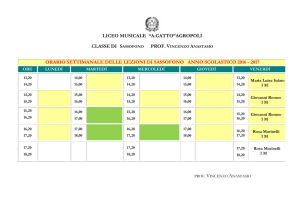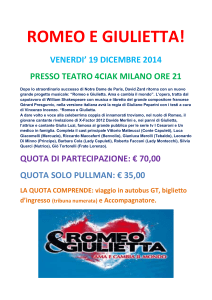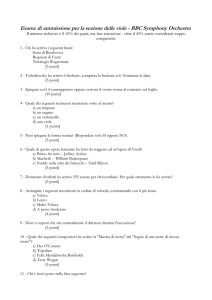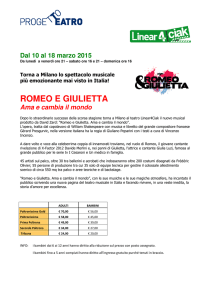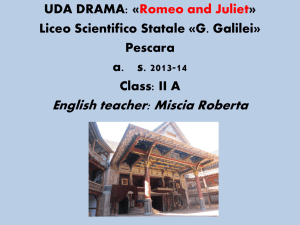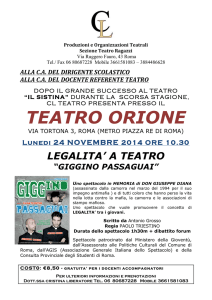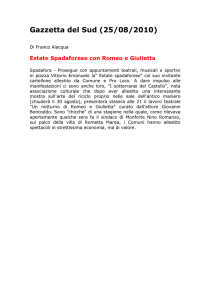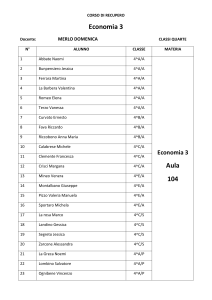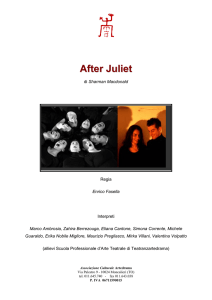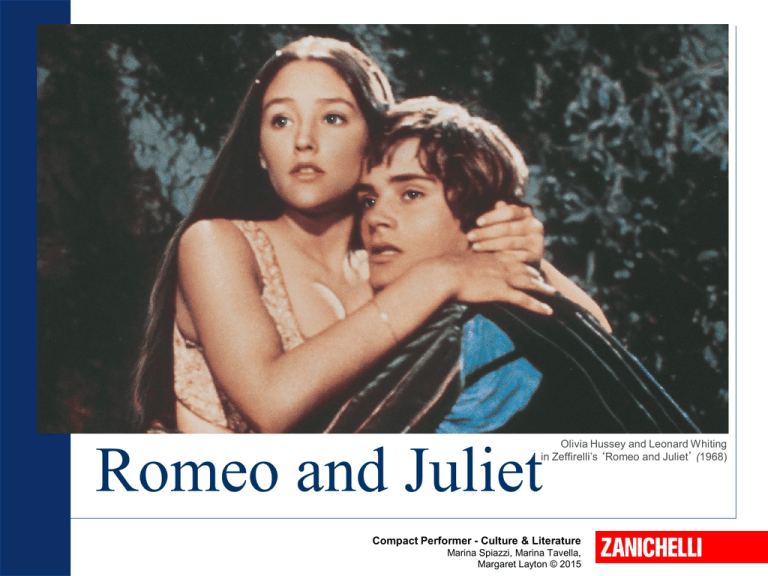
Romeo and Juliet
Olivia Hussey and Leonard Whiting
in Zeffirelli’s ‘Romeo and Juliet’ (1968)
Compact Performer - Culture & Literature
Marina Spiazzi, Marina Tavella,
Margaret Layton © 2015
Romeo and Juliet
1. A very popular play
• It’s one of Shakespeare’s best-known tragedies:
Shakespeare was the first to place love at the centre of
a tragedy.
• It’s the most famous love story of all times.
• There are several film versions.
Olivia Hussey and Leonard Whiting
in Zeffirelli’s ‘Romeo and Juliet’ (1968)
Compact Performer - Culture & Literature
Claire Danes and Leonardo DiCaprio in Baz
Luhrmann’s ‘Romeo + Juliet’ (1996)
Romeo and Juliet
2. The plot
•
The setting in place
Verona
•
The setting in time
four days and four nights
•
The protagonists
two rival families,
the Montagues
and the Capulets;
their children, Romeo and Juliet.
Compact Performer - Culture & Literature
Romeo and Juliet
2. The plot
The first two acts are a love comedy.
• Romeo and Juliet meet at the Capulets’ ball
and it is love at first sight.
• They are secretly married by Friar Laurence.
Compact Performer - Culture & Literature
Romeo and Juliet
2. The plot
•
•
•
The real tragedy starts
in the third act with Mercutio’s
and Tybalt’s deaths; Romeo is
banished from Verona.
In the fourth act Juliet drinks a
potion to avoid the marriage
with Count Paris.
In the fifth act tragic conclusion
of the play with the deaths of the
two lovers.
Compact Performer - Culture & Literature
Romeo and Juliet
3. A comedy or a tragedy?
•
It is a comedy
It is a tragedy
Compact Performer - Culture & Literature
the instant attraction of the young
lovers;
• the masked balls;
• the comic servants;
• the surface life of street fights.
• the tragic role of chance leading up to
the deaths of the two lovers.
Romeo and Juliet
4. Themes
•
The lack of knowledge coming from bad communication.
• Speed as the medium of fate.
•
The competition between the two families.
•
Old hate vs young love.
• Different notions of love:
Absolute love of Juliet, in contrast to other notions of love (for
Juliet’s father is a contract, for Juliet’s nurse is physical attraction, for
Paris is correct behaviour)
Romeo and Juliet
• Fathers and daughters: Juliet, only 14, is strong enough to
oppose her father’s will. Shakespeare’s women characters are not
weak, submissive creatures (differently from the real social
situation)
• The reflection upon the language made by Juliet: words are just
a convention; they do not correspond to the essence of things.
• Appearance vs reality: tragedy comes from believing in
appearance.
Compact Performer - Culture & Literature
Romeo and Juliet
The prologue
Two households, both alike in dignity
(In fair Verona, where we lay our scene),
From ancient grudge break to new mutiny,
Where civil blood makes civil hands unclean.
From forth the fatal loins of these two foes
A pair of star-crossed lovers take their life,
Whose misadventured piteous overthrows
Doth with their death bury their parents' strife.
The fearful passage of their death-marked love
And the continuance of their parents' rage,
Which, but their children’s end, naught could
remove,
Is now the two hours' traffic of our stage—
The which, if you with patient ears attend,
What here shall miss, our toil shall strive to
mend.
Compact Performer - Culture & Literature
Nella bella Verona, dove noi collochiam la
nostra scena, due famiglie di pari nobiltà;
ferocemente l'una all'altra oppone da vecchia
ruggine nuova contesa, onde sangue civile
va macchiando mani civili. Dai fatali lombi di
questi due nemici ha preso vita una coppia di
amanti da maligna fortuna contrastati la cui
sorte pietosa e turbinosa porrà, con la lor
morte, una pietra sull'odio dei parenti. Del
loro amore la pietosa storia, al cui terribil
corso porrà fine la loro morte, e dei lor
genitori l'ostinata rabbiosa inimicizia cui porrà
fine la morte dei figli: questo è quanto su
questo palcoscenico vi rappresenteremo per
due ore. E se ad esso prestar vorrete
orecchio pazientemente, noi faremo in modo,
con le risorse del nostro mestiere, di
sopperire alle manchevolezze dell'angustia di
questa nostra scena.
Romeo and Juliet
The prologue, written in the form of a sonnet, introduces the story,
telling us :
• the setting (Verona)
• the situation of two rival families
• the kind of story: an unhappy love story, where the protagonists
are going to die.
• the important role of fate: the two protagonists are doomed.
• the lovers’ deaths will put an end to the families’ feud.
• the play is going to last two hours.
Compact Performer - Culture & Literature
Romeo and Juliet
The balcony scene
JULIET O Romeo, Romeo! Wherefore art thou
Romeo?
Deny thy father and refuse thy name.
Or, if thou wilt not, be but sworn my love,
And I’ll no longer be a Capulet.
ROMEO (aside) Shall I hear more, or shall I speak at
this?
JULIET (still not knowing ROMEO hears her) It’s only
your name that’s my enemy. You’d still be yourself
even if you stopped being a Montague. What’s a
Montague anyway? It isn’t a hand, a foot, an arm, a
face, or any other part of a man. Oh, be some other
name! What does a name mean? The thing we call a
rose would smell just as sweet if we called it by any
other name. Romeo would be just as perfect even if
he wasn’t called Romeo. Romeo, lose your name.
Trade in your name—which really has nothing to do
with you—and take all of me in exchange.
Compact Performer - Culture & Literature
Giulietta: o Romeo, Romeo, perchè sei tu
Romeo? Rinnega tuo padre e rifiuta il tuo
stesso nome. Ovvero, se proprio non lo vuoi
fare, giurami soltanto che mi ami, ed io
smetterò di essere una capuleti.
Romeo: devo continuare ad ascoltarla oppure
rispondere a ciò che dice ?
Giulietta: è solamente il tuo nome ad essermi
ostile: tu saresti sempre lo stesso anche se
non fossi un Montecchi. Che cosa vuol dire la
parola Montecchi? non è una mano,o un
braccio o un viso, ne un’altra parte che
appartiene ad un essere umano. Oh,sii
qualche altro nome! Quello che noi
chiamiamo col nome di rosa, anche chiamato
con un nome diverso ,conserverebbe
ugualmente il suo dolce profumo. Allo stesso
modo Romeo, se portasse un’altro nome,
avrebbe sempre quella rara perfezione che
possiede anche senza quel nome. Rinuncia
quindi al tuo nome, Romeo, ed in cambio di
quello, che tuttavia non è una parte di te,
accogli tutta me stessa.
Romeo and Juliet
ROMEO (to JULIET) I trust your words. Just call me
your love, and I will take a new name. From now on I
will never be Romeo again.
JULIET Who are you? Why do you hide in the
darkness and listen to my private thoughts?
ROMEO I don’t know how to tell you who I am by
telling you a name. I hate my name, dear saint,
because my name is your enemy. If I had it written
down, I would tear up the paper.
…
JULIET You can’t see my face because it’s dark out.
Otherwise, you’d see me blushing about the things
you’ve heard me say tonight. I would be happy to
keep up good manners and deny the things I said. But
forget about good manners. Do you love me? I know
you’ll say “yes,” and I’ll believe you. But if you swear
you love me, you might turn out to be lying. They say
Jove, also called Jupiter, was the king of the Roman
gods. Jove laughs when lovers lie to each other. Oh
Romeo, if you really love me, say it truly. Or if you
think it’s too easy and quick to win my heart, I’ll frown
and play hard-to-get, as long as that will make you try
to win me, but otherwise I wouldn’t act that way for
anything.
Compact Performer - Culture & Literature
Romeo: ti prendo in parola. D’ora in avanti non
sarò più Romeo.
Giulietta: chi sei tu, così nascosto dalla notte,
che inciampi nei miei pensieri più nascosti?
Romeo:non so dirti chi sono, adoperando un
nome. Perchè il mio nome, o diletta santa, è
odioso a me stesso, perchè è nemico a te. E
nondimeno strapperei il foglio dove lo trovassi
scritto.
…
Giulietta: tu sai che sul mio volto vi è la
maschera della notte, altrimenti un verginale
rossore colorerebbe le mie guancie, a causa di
quello che mi hai sentito dire stanotte. E molto
volentieri mi piacerebbe rinnegare tutto ciò che
ho detto. Ma basta con le forme e i convenevoli.
Mi ami? So già che risponderai si, e che io
crederò a ciò che tu dirai. Ma se lo giuri, potresti
poi dimostrarti sleale. Dicono che Giove sorrida
dei giuramenti degli amanti. O, nobile Romeo,
se davvero mi ami, dillo apertamente, e se credi
che io mi lasci conquistare troppo facilmente,
arriccierò la fronte e sarò cattiva, e mi negherò,
cosicchè tu abbia ragione di corteggiarmi:
altrimenti, non saprei negarti niente per tutto
l’oro del mondo.
Romeo and Juliet
In truth, handsome Montague, I like you too much, so
you may think my behavior is loose. But trust me,
gentleman, I’ll prove myself more faithful than girls
who act coy and play hard-to-get. I should have been
more standoffish, I confess, but you overheard me
talking about the love in my heart when I didn’t know
you were there. So excuse me, and do not assume
that because you made me love you so easily my love
isn’t serious.
Compact Performer - Culture & Literature
O bel Montecchi, io sono davvero troppo
innamorata, e tu potresti interpretare questo
comportamento come frivolo. Ma abbi fede in
me, mio buon signore, ed io saprò
dimostrarmi anche più leali di coloro che
sanno offrire in modo migliore la loro
modestia.
Romeo and Juliet
The balcony scene
• Juliet’s monologue (ll 1-12): it’s a very modern reflection on the
arbitrary nature of language; a word doesn’t correspond to the essence
of things, it’s just a convention. Juliet shows the difference between
appearance (the name “Romeo”, a Montague) and reality (a man).
• Dialogue (ll 13-44): Juliet is ashamed because she has declared her
love, not knowing that Romeo was listening to her. She acted against the
conventional women’s behaviour (a girl shouldn’t reveal her love!), but
now she confirms her love in front of Romeo and she tells him not to
interpret this as a sign of superficiality, because her love is true and
deep.
Romeo is romantic and artful in his words, while Juliet is more direct,
she’s a concrete, passionate, unconventional girl who returns Romeo’s
love.
Compact Performer - Culture & Literature

